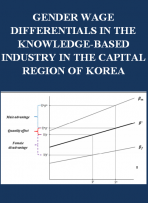Gender Wage Differentials in the Knowledge-Based Industry in the Capital Region of Korea
This study investigates dynamic changes in gender wage differentials in the knowledge-based industry of the capital region of Korea from 2004 to 2009. The paper highlights how gender wage differentials have changed and
demonstrates the aspects of gender wage differentials that exist after subdividing the knowledge-based industry into knowledge-based manufacturing and service industries. The data come from the Occupational Employment Statistics of the Employment Information Service for two different years. The Oaxaca and Ransom and Juhn-Murphy-Pierce (JMP) decomposition methods are applied to examine the evidence of gender wage differentials in knowledge-based industry. The major finding is that gender wage differentials in the entire knowledge-based industry have significantly widened while gender wage differentials in knowledge-based manufacturing have narrowed over the period from
2004 to 2009. More specifically, gender wage differentials have widened by 3.4% in the entire knowledge-based
industry and by 7.1% in the knowledge-based service industry, but have narrowed by 8.4% in the knowledge-based manufacturing industry. We also find that a large portion of the overall wage advantage of male workers can be
explained by a higher average level of human capital, such as education and work experience. In addition, empirical results from the JMP decomposition show that changes in gender differences in the level of educational attainments and occupational position are crucial in reducing gender wage differentials for both knowledge-based manufacturing and service industries. These results shed light on the approach to mitigate gender wage differentials by increasing female workers’ human capital.
Tài liệu được định dạng file PDF(.pdf)
Xem chi tiết tài liệu trong phần Nội dung tóm tắt:
